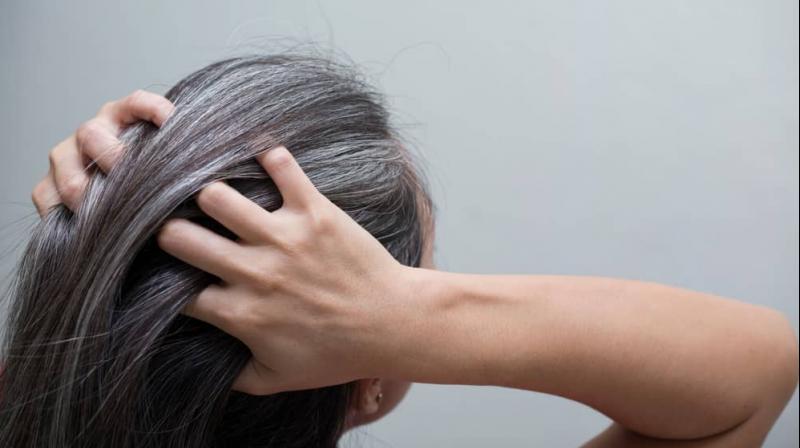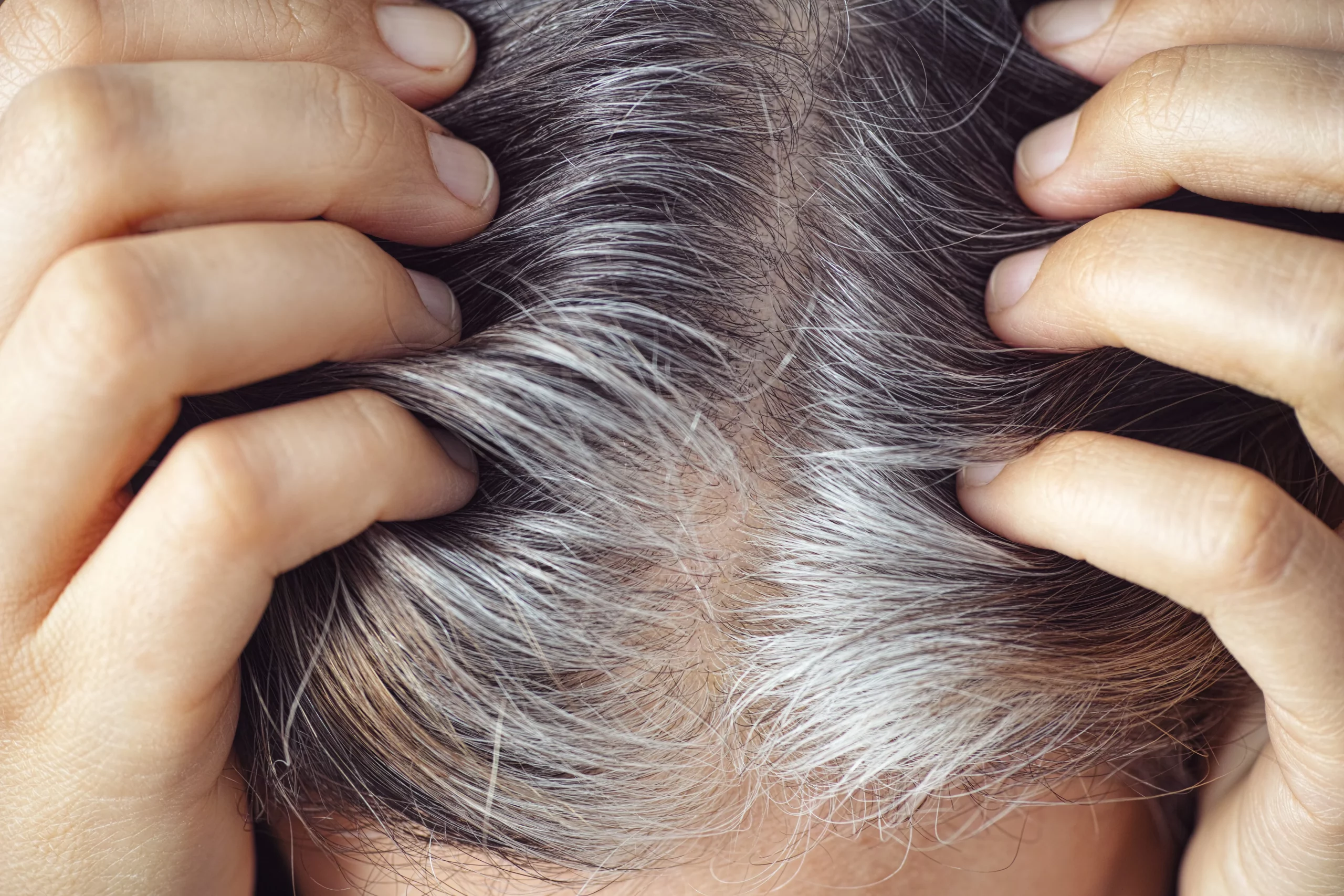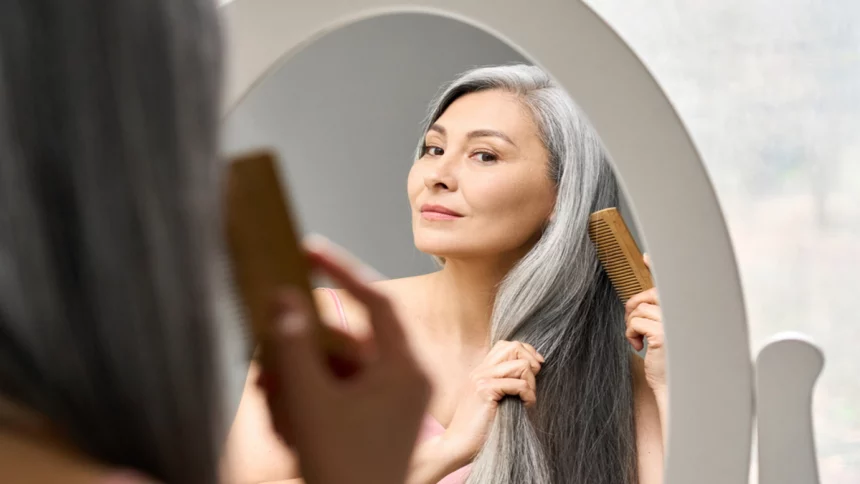Do you worry about grey hair appearing as you age? This guide will explain the causes and ways to prevent white hair in young people.
Do you worry about premature graying? You’re not alone! Many teens struggle with greying hair. Are you looking for ways to stop it? You’re at the right place. Learn the causes of the early appearance of white hair and how to prevent it.
Let’s first examine what graying hair is.
It’s normal to see our hair turning gray as we age. The changes that occur in our bodies over time are responsible for this natural process. Hair follicles are located in our skin, and these contain melanin. Melanin is a pigment which gives hair color. The production of melanin in hair follicles decreases as we age. This results in a loss of hair color.
It is still not known what causes greying hair as we age, but there are a number of factors that may be involved. Greying hair is a genetic trait that tends to run through families. Among the other factors that can contribute to premature graying are oxidative stresses, hormonal changes and nutritional deficiencies.
There is no way to stop or reverse greying, but there are some tips that may slow its progress. A healthy diet rich in vitamins and minerals can be beneficial, especially those that promote melanin, such as zinc, copper, and vitamins B12, B5, and B5. Smoking and excessive stress can cause oxidative damage to the body. Avoiding these factors may help slow the graying process.
Accepting the greying of your hair as part of the ageing process and embracing it is important. For those who want to color their grey hair, there are many options, including hair dyes. Consult a dermatologist or healthcare professional for personalized guidance and advice on how to manage and accept greying hair.
What causes white hair to appear at birth?

Genes
Genetics can play a major role in premature graying. It can influence the cells that produce melanin or the timing for production. Genetic factors may play a role in whether or not you see white hair highlights at 15 years of age.
Our genes greatly influence the color of our hair, and once it has begun to gray, it is not possible to reverse.
“Many cosmetics available change hair color temporarily or permanently preference. Many options semi-permanent and permanent dyes.
Ways hide grey hair, including coloring hair. Many color choose from, fits preferences needs.” You can color your hair to restore youthfulness and hide grey hair.
Remember that premature graying can be a natural process influenced by genetics. There is no single solution. Consult a dermatologist or professional hair stylist for guidance on how to achieve the desired result while taking into account factors like hair health and tone.
Diet
Food we eat can affect the colour of our hair. Unbalanced eating habits that include excessive intake of processed food, cold drinks and sugar can increase the production of free radicals. These free radicals may cause oxidative stresses, which can contribute to premature greying.
Hair health can be affected by a diet that is deficient in vitamins, minerals and antioxidants. Copper, zinc, vitamin B12, and vitamin B5 are essential for the production of melanin, which is responsible for our hair’s color. These nutrients can cause melanin to be disrupted, resulting in premature greying.
A balanced diet is essential to prevent hair from greying and maintain hair health. Include a variety whole foods such as fruits and vegetables, whole grains and lean proteins. Healthy fats and whole grains can also provide nutrients necessary for hair growth.
Other lifestyle choices, such as exercise, proper hydration and stress management, can also help maintain the health and colour of your hair. By avoiding processed foods, salt, and sugar, you can reduce the oxidative stress on your body, which could lead to premature greying.
A healthy lifestyle and a well-balanced diet can help prevent premature graying. As we age, it’s important to make healthy lifestyle and diet choices. A registered dietitian or healthcare professional can offer personalized advice on a diet plan that is best for hair health.
Stress
Stress that is sustained over time may increase the risk of premature graying. Chronic stress is associated with an accelerated graying of hair, regardless of how tired you feel or what your daily routine may be. Stress can cause the hair to grey faster. This is because stress causes the stem cells to die in the hair follicles. These cells are responsible for the production of melanocytes.
According to research, chronic stress may disrupt hair follicles’ normal function and speed up the graying process. Stress can trigger an inflammatory reaction in the body that leads to oxidative damage and melanocyte damage. This can lead to a decrease in melanin, which in turn leads to premature graying of the hair.
Take steps to effectively manage stress. It is essential to understand the impact of stress on the color and health of your hair. Stress-reducing techniques like mindfulness, exercise, sleep and support from family and friends can reduce the effects of stress on hair and our overall health.
A healthy lifestyle, which includes a balanced nutrition, regular exercise and good hair care, can help maintain the natural color of your hair. Avoiding harsh treatments, protecting your hair from heat, environmental damage and using gentle, nourishing hair care products can all help maintain the health and color.
Chronic stress may contribute to premature graying of hair, by depleting stem cell production in hair follicles. To maintain our hair’s health and color, it is essential to prioritise stress management in conjunction with a healthy diet and lifestyle. A mental health or healthcare professional can offer personalized advice on stress management and general well-being.
Minerals and vitamins deficiencies
Deficits in nutrients essentials such as iron and folate, vitamin B12, vitamin D, or vitamin D can also cause premature graying. These deficiencies can affect the production and function of melanin (the pigment responsible for the color of hair).
Iron is essential for the production melanin. A deficiency can result in a decrease in melanin and premature graying of hair. Folate, or vitamin B9, is essential for the synthesis of melanin. Low levels of folate can lead to premature greying.
Vitamin D is important for maintaining healthy hair. A deficiency of vitamin D may disrupt normal hair follicle function, which could lead to premature graying. Vitamin B12 plays a role in the production of melanin. A deficiency of vitamin B12 may affect melanin and cause premature greying.
Low levels of biotin, a form of vitamin B that is also associated with premature graying of hair, are also known. Biotin is important for maintaining healthy hair follicles, and it also supports the production of melanin.
Maintaining a healthy diet, which includes foods high in iron, biotin, vitamin B12 and vitamin D can help prevent deficiencies. Consult a doctor if you suspect that there is a deficiency to determine if dietary changes or supplements are needed.
Lack of essential nutrients, such as iron, biotin, folate and vitamin D can affect melanin and contribute to premature graying. A balanced diet and the correct nutrient intake under the guidance of a health care professional can promote healthy hair.
Oxidative stress
The cause of premature greying or white hair is usually oxidative stress. This occurs when the body cannot neutralize free radicals with antioxidants. Free radicals, which are highly reactive molecules, can damage cells. This includes those that produce melanin pigment, the color of hair.
Antioxidants are essential in protecting cells against oxidative stress and neutralizing free radicals. Oxidative stress is caused by an imbalance of free radicals and anti-oxidants. This can lead to various health problems, including premature graying of the hair.
It is thought that excessive oxidation can cause vitiligo. This condition, which causes depigmentation in the hair and skin, is a result of excessive oxidation. The hair follicles may be damaged in vitiligo resulting to premature greying.
It is essential to maintain a healthy balance of free radicals and anti-oxidants for your overall health. This includes hair health. Fruits and vegetables are rich in antioxidants and can counteract oxidative stresses and reduce the risk of premature hair greying.
A healthy diet is not the only factor that can help maintain healthy hair. Other lifestyle factors, such as managing stress and avoiding environmental pollutants and maintaining good hair care practices, will also contribute.
Premature greying can be caused by oxidative stress, which is a result of an imbalance between antioxidants and free radicals. Adopting healthy hair care habits, reducing stress and eating antioxidant-rich food can help prevent premature hair greying.
Hair products containing chemicals
Regular use of certain conditioners and shampoos can cause premature greying due to chemicals that affect melanin production. Reduced melanin production is responsible for greying hair. Melanin, the pigment that gives our hair its color, is responsible for producing the pigment.
These chemicals are found in many hair care products such as shampoos and conditioners. They can be used to change the color of hair. These chemicals penetrate the hair shaft, breaking down the melanin. This can lead to a loss in color or even the appearance of grey hair.
Hair dyes that contain these chemicals are more likely to cause premature greying. The harsh chemicals found in certain hair care products may also damage hair follicles, disrupting the normal function of melanin producing cells and causing premature greying.
When choosing hair care products, it is important to carefully read the labels and avoid any that may contain harmful chemicals. It is safer to choose natural or organic products for hair care if you want to maintain healthy hair.
Some shampoos, conditioners and hair dyes contain chemicals that can affect melanin and cause premature graying. Choosing safer, natural alternatives to products that are used on hair can help prevent premature graying and maintain hair health.
Smoking
“Smoking harms hair, health. Causes premature graying, affects follicles, vessels.
Releasing toxins dilates blood.” It can lead to a reduction in blood flow, which deprives the hair follicles of oxygen and nutrients necessary for healthy growth. This decreased blood flow over time can weaken hair follicles, and interfere with the production of melanin (the pigment responsible for hair colour). This can lead to premature greying, which often occurs earlier than expected.
Smoking can also damage hair follicles, as well as disrupt the production of melanin, causing premature greying. Smoking can have a negative impact on hair, but it is made worse by the fact that oxidative stress increases in the body. This can lead to premature greying and premature aging.
Avoiding secondhand smoke and quitting smoking can protect your hair’s health and help prevent premature graying. Healthy living, such as a balanced diet, regular physical activity, and reducing your exposure to harmful substances, like cigarette smoke can help you maintain vibrant, healthy hair.
Smoking cigarettes has a negative impact on hair, such as increased blood vessel dilation and reduced blood flow to the hair follicles. Toxic chemicals found in cigarette smoke can also cause direct damage to the hair follicles. Adopting a healthy life style and quitting smoking can prevent premature graying of hair.
Hydrogen peroxide
Over time, hydrogen peroxide can build up on hair shafts. This chemical is produced naturally by hair follicles. The hydrogen peroxide bleaching can cause the hair to turn grey and white.
Hydrogen peroxide is produced in hair follicles as a natural by-product of the melanin pigment, which gives hair its color. The balance between hydrogen peroxide and melanin can be disturbed by age, genetics, or environmental factors. This leads to premature graying of the hair.
Various methods can be used to reduce the buildup of hydrogen peroxide in hair shafts. Use of products containing antioxidants can neutralize hydrogen peroxide, reducing its bleaching effects on hair. Maintaining a healthy lifestyle can also help to support hair health, as well as reduce the amount of hydrogen peroxide that accumulates on hair shafts.
While reducing the hydrogen peroxide may slow down greying, it may also not be enough to restore grey hair to its original color. These methods can vary in their effectiveness depending on each individual and the cause of greying.
The accumulation of hydrogen peroxide on the hair shafts may contribute to greying. Using antioxidants, as well as maintaining a healthy life style, can help slow the process. The hair’s original color may not always be restored. Consult a hair care specialist or healthcare professional for advice on the best treatment options.
There are many medical conditions
Understanding the factors contributing to premature graying is important. Gray hair is known to be associated with thyroid diseases and autoimmune illness. An immune disease can cause inflammation in the body, which may lead to hair loss.
Hair color can be affected by the thyroid gland. The thyroid is a component of the endocrine (hormonal) system. Hair prematurely graying can be caused by thyroid issues such as hormonal imbalances or reduced melanin in the body. The pigment that gives color to hair is melanin. A decrease in production of this pigment can result in gray hair or white hair.
Hair color can be affected by autoimmune diseases. These occur when your immune system attacks tissues and cells in the body. Inflammation caused by autoimmune disease can cause the melanin producing cells to be affected in hair follicles. This leads to premature graying.
It is important to understand the link between medical conditions and premature greying of hair in order to identify potential underlying health problems. Consult a health professional if you notice any sudden or significant changes to your hair color.
How can you prevent white hair in your early years?

You can remove white hair using these tips.
Quit using shampoo every day
Change to a gentler, natural shampoo. Shampoos and conditioners contain harsh chemicals which can cause hair loss and affect hair pigmentation.
Select Natural hair dyes like tea or coffee coloring,
Are great organic hair colors. The dye will take effect after boiling for 15 minutes. When the oils are cooled, add them to your oil blend.
Apply organic conditioners to your hair.
Mix black walnuts with gooseberries and add essential oils. It will soften your hair and stop premature greying.
Dark Chocolates are a great choice.
Copper in dark chocolate stimulates melanin in the body, which helps to prevent graying hair.
Eat foods high in vitamin B12 to prevent hair loss. Freshly picked fruits and vegetables (such as cheese avocado, yeast, plums and oranges) are essential to a diet rich in Vitamin B12.
Henna can be used to heal the scalp
Henna can be used to prevent premature hair bleaching. Apply it once a week. Not only does it stop your hair from fading and drying out, but also white hair will disappear.
Hair oils Olive oil and almond oil nourish your scalp
Apply natural oils to repair damaged hair. The most natural and efficient way to remove white hair is by oiling. It’s also the best way to prevent hair from becoming white before a certain time.
As we age, gray hair is normal. Hair can appear white or gray due to a reduction in pigmentation in hair follicles. This is usually observed in early 20s and late 30s, as part of the ageing process. It may not be possible for the hair to turn completely dark, but certain lifestyle and diet changes can slow the graying down process. You can reduce the appearance of gray hair by incorporating the solutions listed above. However, it may take several weeks before you see visible results.
You can manage premature graying by making lifestyle and dietary changes. Healthy diets that include foods rich in nutrients such as vitamin B12 and vitamin D can help to support hair health. Exercise and avoiding stress can promote your overall health, including hair health.
In addition, if you practice good hair care habits such as using gentle products and avoiding harsh chemicals, you can maintain your hair’s health and delay graying.
It may not be possible for you to get rid of all white hair. However, by making lifestyle and dietary adjustments to improve your hair’s health and appearance, you can slow down graying and maintain a healthy hair color. Consult a dermatologist or healthcare professional for advice on how to manage premature graying.
Conclusion
White hair can be caused by a variety of factors, including genetics, ageing, hormonal imbalances and stress. Although it is not possible to prevent all white hair, you can delay its appearance by following a healthy diet, managing your stress, protecting your hair from the sun, using natural remedies, and avoiding harsh treatments.
Consult a dermatologist or healthcare professional if your white hair is bothering you or is accompanied by any other symptoms. They can offer personalized advice and treatment options. It’s important to remember that embracing your own natural hair color is a choice. There is no wrong or right way. Prioritize your overall hair health and wellbeing and make the best choices for you.












